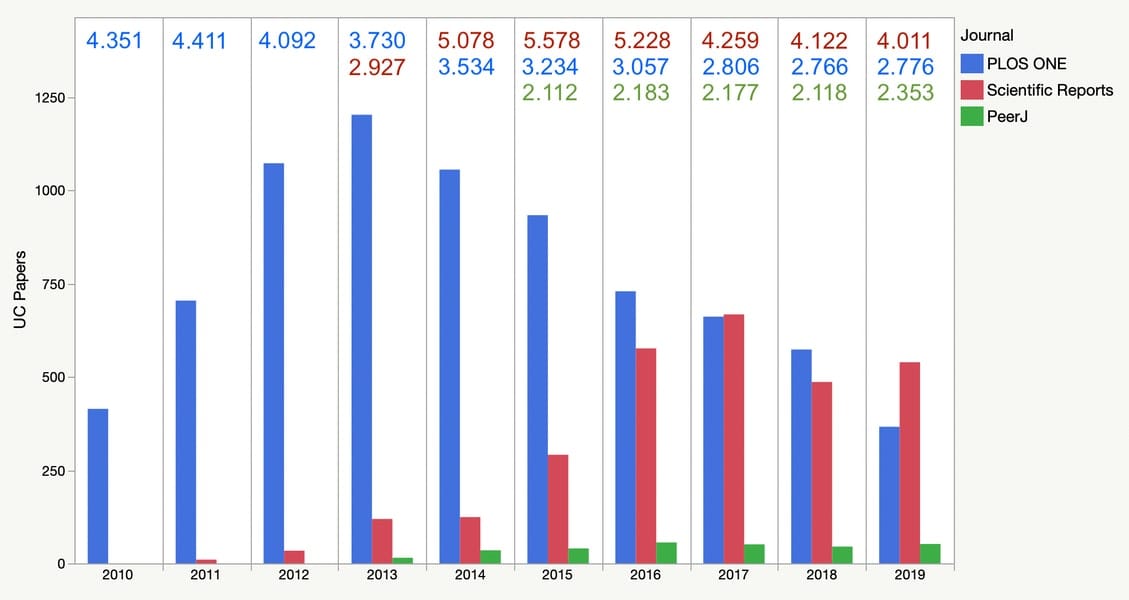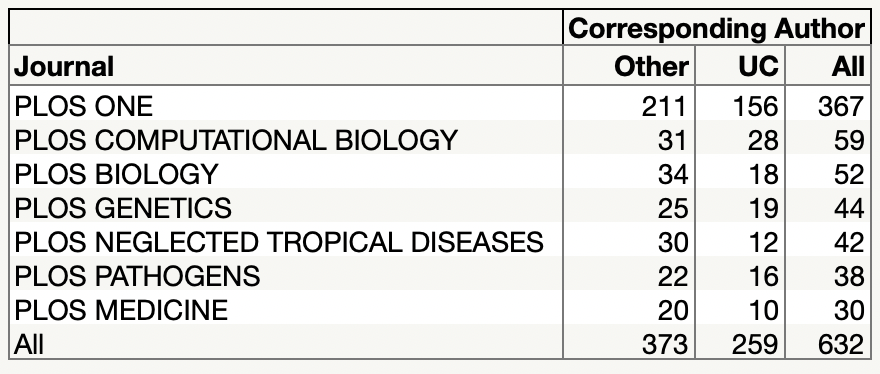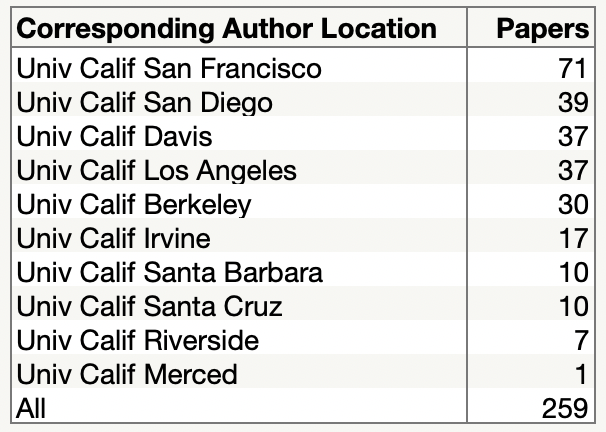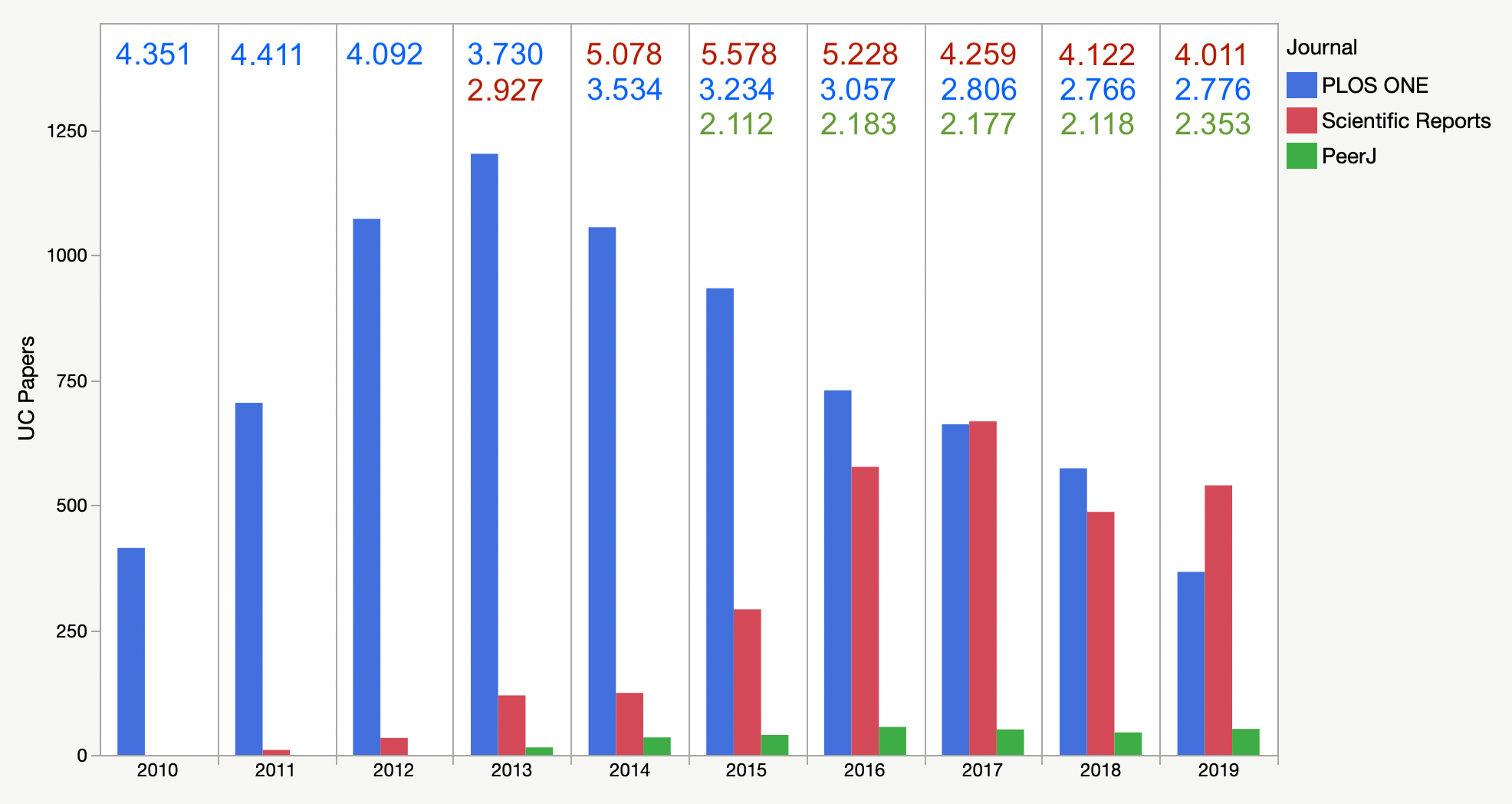Possible Effects of the U Cal-PLOS Deal
Can lower APCs drive authors back to PLOS journals?

Would you publish your paper in a PLOS journal if it were suddenly $1,000 cheaper?
At heart, this is the fundamental question that arises from a new agreement between the Public Library of Science (PLOS) and the University of California (UC).
Under the arrangement, UC Libraries would pay the first $1,000 USD of the article processing charges (APC) “for all UC authors who choose to publish in a PLOS journal.” The UC Office of Scholarly Communications website stipulates that the agreement is limited to UC “corresponding authors.” The APC varies for PLOS journals, from $1,695 to publish a research article in PLOS ONE to $3,000 for PLOS Biology or PLOS Medicine.
At the time of this writing, UC Libraries have similar cost-sharing agreements with Cambridge University Press, JMIR, and has worked out a transformative agreement with the ACM.
While the UC-PLOS agreement is expected to be implemented in April 2020, we can use existing publication data to analyze UC authors relationship with PLOS and project several changes anticipated from this cost-sharing agreement. (After my analysis of the data and interpretation of the results, I include three email responses from the UC Library on outstanding questions and issues.)
In 2019, across all PLOS journals, a total of 632 papers were authored by at least one member of the UC system, according to publication data from the Web of Science (Clarivate Analytics).
However, fewer than half (259 or 41%) of the papers identified a UC campus as the address for the corresponding author (Table 1). Not surprisingly, the majority of these papers came from UC authors residing at institutions with graduate research programs and medical facilities (Table 2). Most papers were also published in PLOS ONE.
Table 1. UC-authored papers published in PLOS journals, 2019.

Table 2. Corresponding authors of PLOS papers by campus, 2019.

If publication rates and authorship behavior remain constant in 2020, we would expect the UC Libraries to pay PLOS more than a quarter of a million dollars ($259,000) in APC fees. UC authors would also pay a quarter of a million dollars less, so the net revenue effect on PLOS would be zero.
Now, it’s hard to believe that this financial agreement would maintain the status quo. One-thousand US dollars can go a long way in purchasing equipment, reagents, supporting a graduate student to attend a conference, among all the other costs of running a lab or field team. By simply reassigning the corresponding author of each PLOS paper to an author in the UC system, the full cost to the UC Libraries could be as much as two-thirds of a million dollars ($632,000) in 2020. Under this (worst-case) scenario, the UC Library spends a lot more money with no additional papers nor additional revenue for PLOS. In every year since 2013, PLOS has been publishing fewer and fewer papers and the same trend is mirrored in the behavior of UC authors.
. . . these subsidies assume that UC authors are price-sensitive. Is this a fair assumption? If so, how much more demand for PLOS journals can we expect in 2020 and beyond?First and foremost, these transformative agreements are not created to simply subsidize publication charges to UC authors. The UC Office of Scholarly Communication views itself as “a leader in the global movement toward access to publicly funded research,” which means increasing the number of UC-authored papers being published as open access. Nevertheless, these subsidies assume that UC authors are price-sensitive. Is this a fair assumption? If so, how much more demand for PLOS journals can we expect in 2020 and beyond?
According to the latest 2018 survey of US Faculty, undertaken by Ithaca S+R, open access status remains a low priority for authors in deciding where to publish their papers (Figure 30). Similarly, an international survey of authors who publish in open access mega-journals reveals that authors place accessibility far below other journal qualities (such as quality of peer review, speed, or Impact Factor). However, cost of publication was a concern for many Indian authors and for those who published in PeerJ. This is not surprising, as PeerJ initially marketed itself as a low-cost publisher modelled on an all-you-can-publish $99 lifetime membership fee. Submissions spiked at PeerJ when, in February 2018, it announced that all manuscripts submitted before the end the month would be published for free. There is evidence of price sensitivity, but it may be limited to particular publishers and author groups.
In the following figure, I plot the number of UC-authored papers appearing in PLOS ONE with two journals (Scientific Reports and PeerJ) that have similar scope, editorial model, and price. If price sensitivity were in play, it should be for these types of journals that provide similar services and therefore may be considered, in a market sense, commodities.
Fig. 1. Publication output of original research articles by UC authors.
Journal Impact Factors are offset by one year to correspond to when the metric is announced.

From the above graph, it appears that demand for publication is following journal JIF performance, with some lag. Given two similar price points, authors are more likely to send their manuscript to the higher performing title. This is not a surprising conclusion, and it affirms every single survey of academic publication preferences.
Furthermore, research into the pricing and demand of open access publication suggests that APC pricing is operating less like a commodities market and more like a market for prestige goods, meaning that demand increases with price. Or put another way, journals with strong brands and greater impact can command higher APC prices.
Submission choices are complex and involve many more factors than just citation performance metrics. Authors build trust relationships with editors and brands, and a good experience is likely to override a simple metric-based decision. Notwithstanding, publishers have been busy building cascading review systems, providing authors with rejected manuscripts the opportunity to publish very quickly in a multidisciplinary OA megajournal without requiring reformatting, resubmission, and reevaluation. As a result, a UC author with a paper rejected from a Nature journal is much more likely to publish in Scientific Reports than decide to restart the entire process anew with PLOS. If the UC-PLOS agreement is an attempt to increase publication in PLOS journals, the price discount it offers UC authors will need to be a strong enough incentive to override performance, prestige, and more importantly, the researcher’s time.
The decline in publication output for PLOS ONE is undeniable, and not just for UC-based authors. An effective $1,000 discount on the full APC ($1,695) may draw some price-sensitive authors back to PLOS titles, especially from titles like PeerJ ($1,095 APC) but the low publication numbers in general (Table 1) suggest that this will result in little effect.
In sum, the UC-PLOS agreement may have little effect on increasing the number of UC-authored papers being published in PLOS journals. If there is some increase, it will likely come from publishers that do not have their own open access megajournal and a cascading review model. It may also draw price-sensitive authors from other open access publishers, like PeerJ. More likely, the UC-PLOS agreement will simply change the designation of the corresponding author in cases of institutional collaboration. Unfortunately, this does little to support PLOS or open access publishing.
Editor’s Note: We are presenting the actual email inquiries and answers from the UC’s California Digital Library below.
Questions and Responses
Ivy Anderson is the associate executive director of UC’s California Digital Library. Jeff MacKie-Mason is the university librarian and chief digital scholarship officer at UC Berkeley, where he is also a professor in the School of Information and a professor of economics. Anderson and MacKie-Mason co-chair UC’s Publisher Negotiation Task Force, representing the faculty senate’s University Committee on Library and Scholarly Communication (UCOLASC), the Council of University Librarians (CoUL), and the California Digital Library (CDL).
Q1: With regard to offsetting Article Processing Charges (APCs), is there a limit on the total amount of publication support that the UC Libraries is willing to spend per year?
In general, we are seeking agreements that allow us to control costs and achieve 100% open access, with a goal of expenditure reduction for our journals portfolio as a whole when compared to existing subscription expenditures. As we negotiate individual agreements, we will assess the financial outcome of those agreements against our overall modeling in order to chart our progress against that goal.
Q2: The agreements on supporting APCs specifies that the “corresponding author” needs to be a member of the UC System. In the case of collaboration across multiple institutions, do you have concerns that the corresponding author designation will be changed to take advantage of the monetary support?
There are many considerations that go into deciding who the corresponding author is on an article. It is possible that monetary support from the UC Libraries will affect that decision by some author teams, though reports from other publishers in various parts of the world suggest this effect is likely to be very small. One assessment objective of the pilot agreements we’re undertaking will be to observe and evaluate the impact of these agreements on author behavior.
Q3: As you well know, there are many open access publishers, thousands of open access journals, as well as hybrid journals (subscription-access journals that allow authors to purchase an open access publication option). Do you have priorities for which publishers/journals may enter a publication arrangement with UC? Is this a first-come, first-agreement scenario?
Our ultimate goal is for all articles published by all UC authors to be open access. We believe it’s important to work with a diverse range of publisher types in order to promote a healthy scholarly publishing ecosystem. Key considerations about where to best begin our conversations include publishers with a significant share of UC authorship and input from our user community. In a published document (available here), we set forth guidelines that the University of California applies when evaluating systemwide transformative agreements with publishers and deciding which specific agreements to enter into.
Phil Davis is a publishing consultant specializing in the statistical analysis of citation, readership, publication and survey data. He has a Ph.D. in science communication from Cornell University (2010), extensive experience as a science librarian (1995-2006) and was trained as a life scientist. https://phil-davis.org/